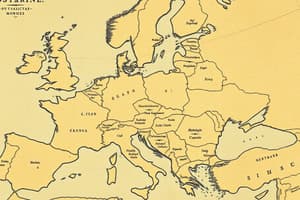Podcast
Questions and Answers
Flashcards are hidden until you start studying
Study Notes
Magna Carta
- Magna Carta was a document created to limit the power of the English monarch.
- It aimed to protect the rights of the barons and other freemen.
- It established principles of due process and legal protection.
- It's historically significant as a cornerstone of constitutionalism.
- It influenced later legal systems, emphasizing individual rights and limitations on government power.
Medieval European Society
- New farming techniques, like the three-field system, increased food production, boosting population.
- Increased agricultural output led to a growing population and urban centers.
- Trade expanded across Europe, with merchants exchanging goods such as textiles, spices, and precious metals.
- Artisans formed guilds to regulate their crafts and trading standards.
- Guilds provided support systems and training for their members.
- Guilds were known for superior craftsmanship standards and protecting the rights of skilled workers.
- Country life revolved around agriculture while city life was centered around trade and crafts.
- Education in medieval Europe was primarily focused in religious institutions.
An Age of Faith
- The Church profoundly influenced European society during the Middle Ages, shaping laws, education, and culture.
- Mendicant orders were religious groups living simply and preaching to the common people.
- Gothic cathedrals typically featured pointed arches, ribbed vaults, and stained glass windows.
- Medieval universities emerged as centers of learning, focusing on theology, law, and medicine.
- St. Thomas Aquinas was a leading medieval theologian who combined Christian thought with Greek philosophy.
- His main beliefs emphasized reason and faith, attempting to reconcile Aristotelian logic with religious doctrine.
Studying That Suits You
Use AI to generate personalized quizzes and flashcards to suit your learning preferences.





